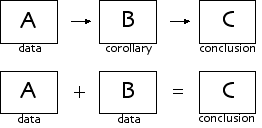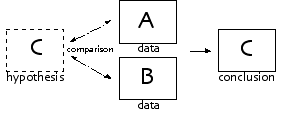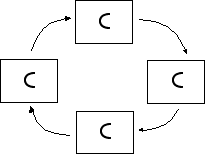| Deduction and Induction | 2003-11-03 13:27 4 comments |
by Flemming Funch There are two methods of logical reasoning that are often contrasted with each other. There are two methods of logical reasoning that are often contrasted with each other.
Here's deduction. That's when A leads to B that leads to C. Or A + B leads to C for that matter. You try to follow a logical sequence, trying to include all the facts and weeding out any variables, in order to logically prove the inevitable conclusion. Because this is true, then that must be true, and therefore we can conclude so-and-so. These are some of the problems with deduction: A. The human mind is badly suited for including all relevant facts. We use pattern matching to make sense out of anything, so no matter what we think is concise, comprehensive and logical, it most likely isn't. B. The human language is not precise. Words are abstract, and different people don't mean exactly the same by them. C. Deduction can fairly easily be manipulated by providing or revealing only those elements that will support a given conclusion.  Then there's induction. That's where you make a mental leap and guess at the conclusion first, and then you go and check if it fits with the facts at hand. And, presumably, if you succeed in coming up with a theory that fits all the facts and hand, and that can be repeated and verified, then you've got a good answer. Or you'll find out that your hypothesis is wrong, because it doesn't explain the facts you see. Then there's induction. That's where you make a mental leap and guess at the conclusion first, and then you go and check if it fits with the facts at hand. And, presumably, if you succeed in coming up with a theory that fits all the facts and hand, and that can be repeated and verified, then you've got a good answer. Or you'll find out that your hypothesis is wrong, because it doesn't explain the facts you see.
Some of the problems with induction are: A. The human mind is also rather badly suited for coming up with original explanations that aren't based on what previously has been fed in. B. If one starts believing the inducted idea, there's a tendency to filter out any data that doesn't fit it, and it doesn't actually get verified. And there's a problem with both that they're all just good guesses. You can be good at logic, and follow stringent steps of analysis and reasoning, and consistently come up with good predictions, much superior to blind, random guesses, but they're still really just qualified guesses. Good science uses both deduction and induction. You use induction to come up with new theories that might explain more things, and you do experiments and deduct what they're showing you. Bad science does roughly the opposite. E.g. make new theories and forget to verify them properly. Or, deduct from previous theories in order to conclude what's impossible and therefore shouldn't be explored. And rule out new theories because they don't fit with the old theories. You know, "planes can't fly because they're heavier than air", or "we won't see any extraterrestrials come here because it is impossible to travel faster than light". Personally I like using deduction for solving puzzles, and I tend to be good at drawing the logical conclusion from data that is available. But to create my picture of the world, I much prefer to use induction. I.e. I search for, or imagine, the models that will explain more of the world I know than the models I previously used. And which I can verify by experiment in my own life, and/or which will better predict events than the alternative models. I recommend it. But watch out for people who would like to sell you more limiting world views and explanations, based on that they have been "proven" and yours have not. The logical wires have been crossed a bit there. If you have a model or world view that allows you to successfully understand, explain and predict many things, don't buy a model that explains and predicts less, no matter what authority backs it up, or questions yours. Astrology is a fine example there, particularly because a lot of people will think that it isn't. If you're a skilled astrologer who can probably successfully understand and explain and predict lots of things about people, you might once in a while run into an angry scientific type who insists that it is a big fraud, and you're an idiot, because nobody's found any mysterious rays from the planets that are controlling people. And he's typically implicitly inviting you to drop your large vocabulary of patterns and archetypes and relationships, and replace it with, essentially, the belief that you can't really predict anything much about people's lives and personalities, and random data and luck is about the best you can get. Is that better? If astrology actually works for you, obviously no. If it doesn't, maybe you should keep looking. Reading tea leaves is not necessarily better than checking out the available facts. The test is of course whether it works. The most satisfying, all-encompassing, verifyable, workable, simple explanation is the better one. That it is big and complex doesn't make it better. Simpler is better. But the point is to use the model that works best for you.  So, what about, say, religious explanations? Well, if you're actually reasoning yourself conscioiusly towards a more complete cosmology, the same rules apply. If you're accepting somebody else's explanation, you might very well be subject to the pitfalls mentioned above. I.e. you get to see exactly what you expect to see and nothing else. Specifically religious discourse seems to be fruitful ground for the circular kind of reasoning, where you logically 'prove' to yourself that the foundation for your belief is sound, simply by starting with a datum and coming back to it a little later. So, what about, say, religious explanations? Well, if you're actually reasoning yourself conscioiusly towards a more complete cosmology, the same rules apply. If you're accepting somebody else's explanation, you might very well be subject to the pitfalls mentioned above. I.e. you get to see exactly what you expect to see and nothing else. Specifically religious discourse seems to be fruitful ground for the circular kind of reasoning, where you logically 'prove' to yourself that the foundation for your belief is sound, simply by starting with a datum and coming back to it a little later.
You know, "Jesus died for MY sins, so I really owe him to listen to his words, and what he says is in the bible, so it must be true, because he said it, and it says that he died for my sins." A mix-up of what is the hypothesis and which is the data. "Nothing can travel faster than light because we have a theory that says so, so therefore we aren't looking for it, and therefore we haven't seen anything do so, and therefore it is proven." Evolutionists versus Creationists is probably another area where you'll find plenty of circular reasoning, where you prove your point by your own arguments. One way or another, there isn't quite any logical panacea that you can prove everything with. Developing a useful picture of the world is done with some mixture of an open mind, your own intuition, keen observation, experimentation, luck, good advice, access to good data, verificaton of the validity of data AND some discipline of logical reasoning. |